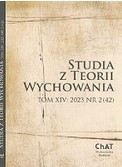Half-education as a hermeneutic challenge for religious education in schools
Half-education as a hermeneutic challenge for religious education in schools
Author(s): Bogusław MilerskiSubject(s): School education, Hermeneutics, Sociology of Education, Sociology of Religion, Philosophy of Education, Pedagogy
Published by: Wydawnictwo Naukowe ChAT
Keywords: theory of education; pedagogic hermeneutics; half-education; Halbbildung; religious education;
Summary/Abstract: School is not a place of neutral education. The theory and practice of “school life” are conditioned not only by pedagogical, cultural and legal concepts, but also by the forms of social consciousness and ideological interests of various social groups. The idea of half-education or Halbbildung was formulated by Th.W. Adorno. It describes a distorted education, organized around dominant ideological interests, including utilitarian and instrumental thinking. In this article, the concept of Halbbildung is applied to school religious education in Poland. Not only does this concept reflect the hermeneutic dimension of critical theory but also underpins the hermeneutics of educational practice. The analyses presented use data on students' participation in religious education lessons and the results of original research on the rationality of school education. Such a critical approach is an impulse to reflect on the essence of religious education at school, especially in light of the idea to make religion a compulsory school subject. The obligatory status of religious education as part of the curriculum of in public schools poses a challenge to the pedagogical discourse in Poland and in other countries that have made or are considering such a decision and in such a scope. From a theoretical perspective, this is a challenge in terms of pedagogical hermeneutics.
Journal: Studia z Teorii Wychowania
- Issue Year: XIV/2023
- Issue No: 2 (43)
- Page Range: 419-440
- Page Count: 22
- Language: English

